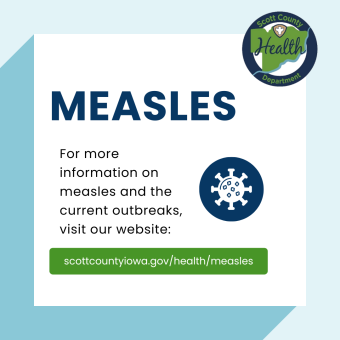Measles
There are multiple outbreaks of measles in the United States: Measles Cases and Outbreaks (Centers for Disease Control and Prevention)
Measles is an acute, highly communicable viral disease that is spread through the air by droplets from the nose, throat, and mouth of an infected person. A person may breathe in the droplets or touch a surface contaminated with the droplets and become infected.
Measles symptoms usually appear 7 to 14 days after an infection. Initial symptoms can include:
- High fever
- Cough
- Runny nose
- Watery, red eyes
- Koplik spots (tiny white spots in the mouth)
- Rash (usually begins 3 to 5 days after initial symptoms)
Someone with measles is contagious four days before the rash appears through four days after the rash appears. If you think you may be infected, call your healthcare provider to discuss your symptoms before showing up to a clinic or emergency room to avoid exposing other people.
Prevention
The best way to prevent measles is to get vaccinated. The MMR vaccine is safe, thoroughly tested, and highly effective in protecting both you and your community. Two doses, given at least 28 days apart, offer the best protection.
MMR Vaccine Available at SCHD
Due to ongoing measles outbreaks across the United States, the Scott County Health Department, in partnership with the Iowa Department of Health and Human Services Immunization Program, is offering the MMR (measles, mumps, and rubella) vaccine free of charge to all individuals, regardless of insurance status or residency.
If you have never received the MMR vaccine, or have only received one dose, you can walk into the Scott County Health Department Monday through Friday, from 8:00 a.m. to 4:00 p.m. No appointment is necessary.
For more information about measles, contact your healthcare provider or call the Scott County Health Department at 563-326-8618.
Measles-mumps-rubella (MMR) vaccine recommendations by age/year of birth and vaccination status
| Age | Standard Recommendation | Comments | |
| 6-11 months | As of July 15, 2025, public health is strongly recommending an accelerated schedule where vaccine would start before twelve months. | These kids are generally protected by maternal antibodies. In an outbreak, public health may consider recommending starting as early as 6 months. | |
| Children 12 months and older | 2 MMR doses separated by at least 28 days | The second dose is usually before school entry at 4-6 years, but during an outbreak any time more than 28 days from the first dose is acceptable. | |
| Teens and adults without evidence of immunity to measles | At least one dose of MMR; a second dose may be recommended depending on the risk for severe disease | A measles blood test (for IgG antibodies) can be done to document immunity but is not generally recommended. It is relatively expensive, has both false positive and false negative results and takes several days to provide answers. | |
| Born before 1957 | No vaccine needed (except for healthcare workers without proof of immunity) |
The general public is assumed to have been infected with good, life-long immunity. Healthcare workers must provide evidence they are immune - either 2 doses of MMR or a positive IgG test. |
|
| Born during 1957 or later | Had 2 doses of MMR | No further vaccine or testing is needed | |
| Vaccinated during 1963-67 | One dose of current MMR | The vaccine during this interval was less effective than current MMR | |
| Vaccinated during 1968-89 | One dose of current MMR | Only a single dose of MMR was recommended during this interval | |
| Unknown vaccination history | At least one dose of current MMR | Testing for measles IgG is a less favored approach as noted above | |
Speak to your healthcare provider before getting an MMR vaccine if one or more of the following apply to you currently:
- You have had a severe reaction to a prior MMR dose
- Your immune system is severely damaged by illness or medical treatment, including high-dose steroid treatment 14 days or more
- You have a close relative with a familial or genetic immune deficiency
- You are pregnant
If you are travelling to an area with a high risk of measles transmission, speak to your healthcare provider more than 2 weeks ahead of your departure.
Contact your healthcare provider, pharmacy, or local Health Department if you are in need of a measles vaccine.
Resources
For additional information about measles, the current outbreaks, and vaccination, visit the resources listed below.
Iowa Department of Health and Human Services - Measles Disease Information
- Measles Fact Sheet
- What Iowans Should Know About Measles
Centers for Disease Control and Prevention - Measles
Centers for Disease Control and Prevention - Clinical Overview of Measles
Centers for Disease Control and Prevention - Measles Vaccination


